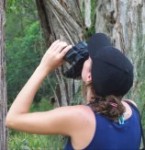Young people and volunteer research
WTA Chair Dr Ronda Green presented this 4-minute talk in the “Inspiring the Next Generation” theme at the recent World Parks Congress n Sydney:
 It’s great when young people get ‘switched-on’ to nature, but they can then become frustrated and discouraged by not knowing others who share their enthusiasm, a lack of opportunity to actually do something for conservation of the animals and forests or reefs they have come to love, and a lack of confidence in their ability to do something useful if such opportunity does arise.
It’s great when young people get ‘switched-on’ to nature, but they can then become frustrated and discouraged by not knowing others who share their enthusiasm, a lack of opportunity to actually do something for conservation of the animals and forests or reefs they have come to love, and a lack of confidence in their ability to do something useful if such opportunity does arise.
The Australian Wildlife Research Network was founded by Wildlife Tourism Australia, originally for communication between tour operators conducting or assisting with research but not knowing of each others’ existence, but has been expanded to include networking between tour operations and academics for mutual benefit, and between tour operators and volunteer tourists, including young adults, teenagers and families with children.
The network website also includes information on identification guides, field equipment, monitoring methods, literature on working with volunteers and other guidelines for academics, tour operators and the volunteers themselves.
Young folk can be inspired and encouraged by opportunities to experience wild places and wildlife, socialising with other enthusiasts and interacting with researchers, and knowing they are contributing to useful research or monitoring for conservation management or to the general understanding of our wildlife ecology and behaviour.
The network, which includes tours, ecolodges and wildlife parks involved in research, is the only one we know of that focuses on wildlife research and monitoring connected with tourism throughout Australia and including projects for all budget levels and ages to join in with.
A successful project involving volunteers has to be well-planned, including clear explanation to participants on what to expect, friendly greeting, effective training on what needs to be done, appropriate assignment of tasks, from carrying or cleaning equipment through helping to find animals to actually taking measurements or recording observations, opportunity for participants to socialise, and where possible to safely experience being alone in nature, and to learn about the animals and ecosystems they are experiencing, and also whether the data is to be collected in a way consistent with valid analysis or comparison (for instance between seasons, or the progression of a restoration plot) and for valid conclusions to be made, and how the information collected will ultimately be used. Feedback from participants and stakeholders is also important
It’s not enough to ignite a fire, we have to keep the flame alive amongst our youth, and the Australian Wildlife Research Network is one vehicle to assist with this.
To find out more, please visit wildliferesearchnetwork.org.au

It is a very good idea of involving the young talent for wildlife research. And also your website gives some very important information about wildlife research, wildlife of Australia. Thanks for sharing useful information.